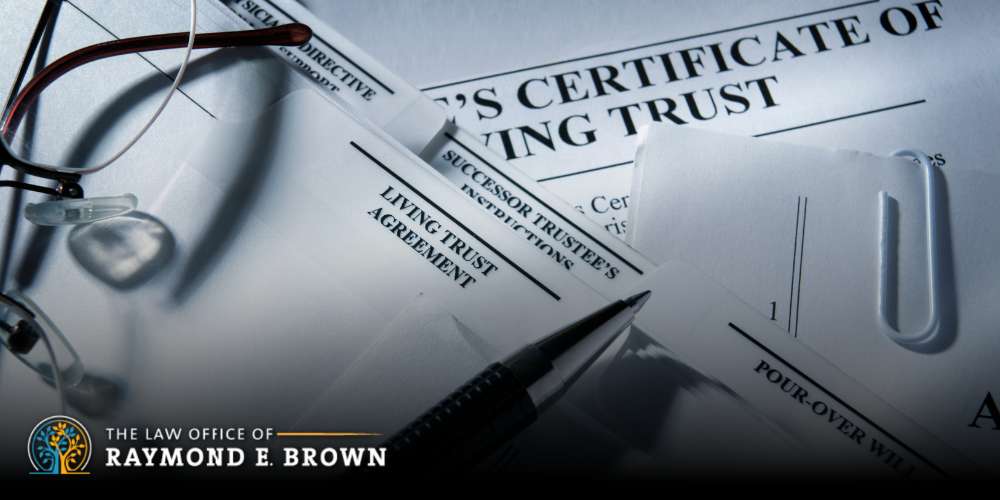At the Law Office of Raymond E. Brown, our Annapolis estate planning attorneys understand the evolving nature of life circumstances and relationships, which means that the terms of a trust document established at one point might not serve the best interests of its beneficiaries or reflect the grantor’s current intentions over time.
Not only can our experienced estate planning lawyers help you draft a trust and other estate planning documents, but they can also help make changes and adjustments that reflect your desires and needs.
Whether you need help creating an estate plan or making a trust amendment, our attorneys are here to help. Call The Law Office of Raymond E. Brown at (443) 554-9944 to schedule a consultation with an Annapolis estate planning attorney today.
Understanding Trusts and Their Purpose
A trust is a legal document that allows a third party, or trustee, to hold assets on behalf of the trust beneficiaries. The primary role of trusts in estate planning is to ensure assets are distributed according to the grantor’s wishes, potentially avoiding the probate process, minimizing estate taxes, and offering protection to the beneficiaries.
There are many different types of trusts, each designed to fulfill specific purposes. Some of these include:
- Revocable Trust (Living Trust): This type of trust can be altered or closed by the grantor at any time during their lifetime. It becomes irrevocable upon the grantor’s death.
- Irrevocable Trust: Once established, this trust cannot be changed or revoked. This type of trust document is often used for estate tax reduction and asset protection.
- Special Needs Trust: These trusts are designed to provide for beneficiaries with disabilities without impacting their eligibility for government assistance.
- Asset Protection Trust: Formed to protect assets from creditors, lawsuits, or judgments. These are often established in jurisdictions with favorable asset protection laws.
- Qualified Personal Residence Trust (QPRT): Enables a grantor to transfer a personal residence to a trust at a reduced gift tax value, retaining the right to live in the home for a term of years.
- Dynasty Trust: Designed to last for multiple generations to pass wealth while avoiding estate taxes at each generation.
- Bypass Trust: Also known as credit shelter trusts, these irrevocable trusts help reduce estate taxes by passing assets to a trust, accessible by the surviving spouse, without being subject to estate taxes upon the spouse’s death.

Why Might Someone Need to Modify a Trust?
The decision to modify a trust often stems from shifts in personal circumstances, family dynamics, or legal and tax landscapes. Marriages, divorces, births, and deaths can significantly impact one’s estate planning objectives, requiring adjustments to how trust assets are distributed or who is designated as beneficiaries.
Changes in relationships among family members might also prompt a trust amendment to ensure they reflect current wishes and familial situations.
As tax and inheritance laws evolve, a trust established under previous regulations might no longer provide the intended fiscal advantages, making modifications essential to optimize tax benefits.
Can a Revocable Living Trust Be Changed?
A revocable living trust can be amended if the grantor is still alive and competent. This flexibility is one of the key benefits of revocable living trusts, as they allow the grantor to adapt the trust provisions to reflect changes in life circumstances, financial situations, or personal wishes.
Whether it’s modifying the beneficiaries, changing the terms of asset distribution, or appointing a new successor trustee, the grantor retains the authority to make these adjustments at any time, ensuring the trust remains aligned with their evolving estate planning objectives.
Can an Irrevocable Trust Be Changed?
Modifying an irrevocable trust is more complex and restricted than a revocable trust. However, under certain circumstances, changes can be made. These may include judicial modifications if all beneficiaries consent and the modification does not interfere with the trust’s primary purpose or through mechanisms like decanting, where assets are transferred from one trust to another with different terms. Additionally, some irrevocable trusts include provisions for ‘trust protectors,’ individuals granted the power to make specific amendments to the trust.
While the flexibility of an irrevocable trust is limited, legal avenues are available to adjust its terms in response to changes in laws, financial circumstances, or the needs of the beneficiaries, although with certain constraints and often requiring court approval or unanimous consent from all beneficiaries.
Maryland Trust Decanting Act
The Maryland Trust Decanting Act provides a legal framework for modifying irrevocable trusts by allowing the trustee to “decant” the assets from the original trust into a new trust with different terms. This process enables trustees to address changes in law, correct administrative issues, or adapt to the changing needs of the beneficiaries without needing court approval.
The Act outlines specific conditions and procedures that must be followed, including considerations of the original trust’s purposes and the interests of the beneficiaries.
Decanting offers a flexible tool for estate planning, enabling trust assets to be managed and distributed to reflect current circumstances and intentions while still respecting the essential goals of the trust’s grantor.

Who Can Modify a Trust in Maryland?
In Maryland, the ability to modify a trust depends on the type of trust and the provisions within its governing document. For revocable trusts, the grantor, the individual who established the trust, has the sole authority to amend or revoke the trust as long as they are alive and competent. This allows the grantor flexibility to adjust the trust’s terms in response to changes in personal circumstances or objectives.
In the case of irrevocable trusts, modification is more restricted and usually requires approval from the court or consent from all beneficiaries, depending on the specific circumstances and the trust’s provisions. Certain statutes, like the Maryland Trust Decanting Act, provide additional avenues for modification under specific conditions, allowing trustees to adjust terms to serve the beneficiaries’ interests better or comply with changes in law.
Trustees, grantors, and in some cases, beneficiaries, have roles in the modification process, guided by the trust document and Maryland state law.
Trustee Powers and Discretion
Successor trustees wield considerable powers and discretion in handling and distributing the assets of a trust. Their responsibilities range from investing trust assets and making distributions to beneficiaries to filing trust taxes and keeping accurate records.
The extent of a trustee’s authority to make changes or adjustments is largely defined by the trust agreement, which may grant them broad discretion in certain areas, such as determining the timing and amount of distributions based on beneficiaries’ needs or the trust’s financial status. Successor trustees must operate within the scope of this authority, always acting in the best interest of the beneficiaries and the trust’s terms.
In some cases, trustees may also have the power to amend trust terms or reallocate assets through mechanisms like decanting, provided such actions are permitted by the trust document and state law and are undertaken to achieve the trust’s objectives better or respond to changes in circumstances.
How To Change a Living Trust
Changing a living trust involves specific methods for modification or amendment, guided by the trust’s terms and applicable legal regulations. Typically, the trust document outlines the procedure for making changes, which often requires the trust’s grantor, the individual who established the trust, to execute a formal amendment or restatement. This trust amendment must be drafted with precision, reflecting the grantor’s new wishes while adhering to the legal framework governing trusts.
For revocable living trusts, the grantor usually has broad discretion to make changes at any time. However, modifying an irrevocable living trust is more complex and may involve obtaining consent from beneficiaries or seeking judicial approval.
Legal requirements and limitations also vary by jurisdiction, emphasizing the need for compliance with specific statutes, such as those governing the notification of beneficiaries or the formalities of executing amendments.
Can I Amend My Living Trust Without an Attorney?
Trust amendments require a thorough understanding of estate planning principles and compliance with specific legal formalities to ensure they are legally valid and reflect your intentions accurately.
For a beneficiary or successor trustee change, a grantor might feel comfortable amending with the aid of do-it-yourself legal documents or guides. However, more significant alterations could impact the trust’s structure or tax implications. Missing critical legal nuances or failing to adhere to state laws can render amendments ineffective or jeopardize the trust’s objectives. As such, it is often highly recommended that those looking to modify a trust document seek the help of an experienced estate planning attorney.

The Importance of Having an Attorney When Updating Trusts in Maryland
Maryland state planning attorney Raymond E. Brown brings invaluable knowledge and experience in navigating trust modifications, ensuring that any potential changes comply with Maryland’s legal requirements and serve your best interests.
Furthermore, attorneys like Raymond E. Brown can offer strategic advice on optimizing trust structures for tax benefits, asset protection, and beneficiary support, ensuring that your trust remains a strong component of your estate plan.
Call Annapolis Estate Planning Attorney Raymond E. Brown for Legal Assistance With Trust Modifications in Maryland
For dedicated guidance and legal assistance with trust modifications in Maryland, look no further than Annapolis trust attorney Raymond E. Brown. Whether you’re looking to update a living trust or simply navigating estate law, the Law Office of Raymond E. Brown stands ready to provide the support and legal skills it takes to protect your assets and legacy.
Call (443) 554-9944 or reach out online today to secure your future and gain peace of mind in your estate planning ventures.

